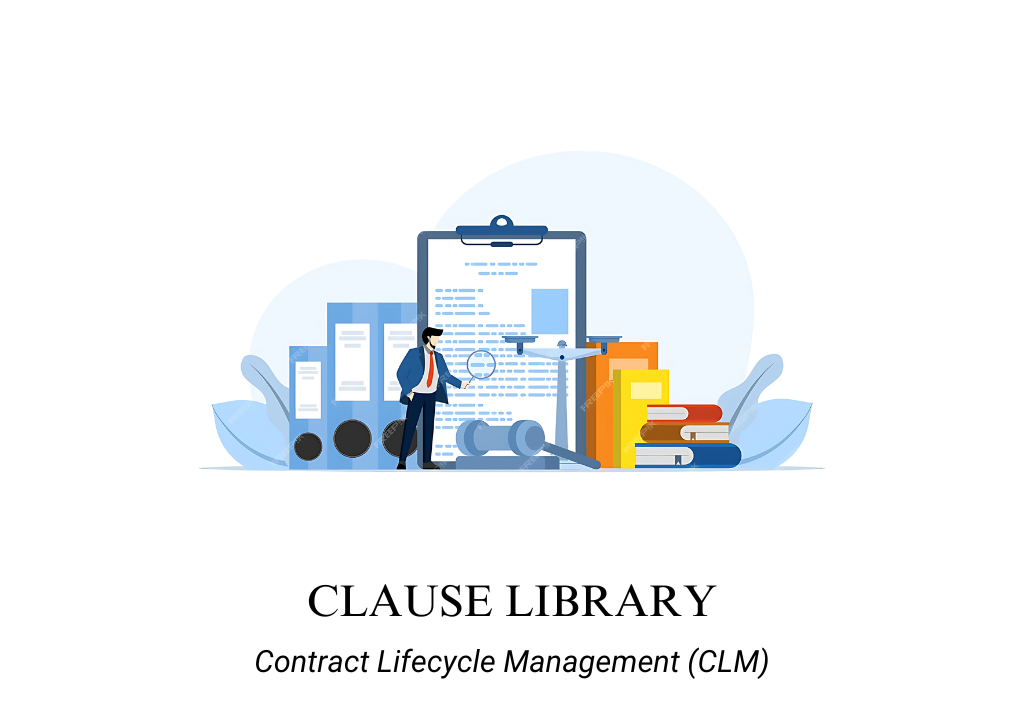Introduction
The Clause Library is a key functionality within Contract Lifecycle Management (CLM) tools that provides a centralized repository for storing, managing, and accessing standardized contract clauses. This functionality is designed to streamline the contract drafting process, ensure consistency, and enhance compliance by using pre-approved clauses that align with an organization’s legal and regulatory standards. By leveraging a clause library, organizations can reduce the time and effort involved in contract creation and minimize the risks associated with using unapproved or inconsistent language in contracts.
The Clause Library functionality in a CLM tool includes various features that facilitate the efficient management of contract clauses. These features allow users to create, store, review, approve, and update clauses as needed, ensuring that all contract documents are created using the most current and compliant language. A well-managed clause library helps organizations maintain control over their contract content, reduce negotiation cycles, and improve overall contract quality.
Features of Clause Library
Clause Library
Definition: The Clause Library is a centralized repository within a CLM tool that stores a collection of pre-approved contract clauses. These clauses can be easily accessed and inserted into contracts, ensuring consistency and compliance across all contractual documents.
Purpose: The purpose of the Clause Library is to provide a standardized set of clauses that can be reused across multiple contracts. This feature helps organizations ensure that contracts are drafted using consistent language, reducing the risk of errors and enhancing legal and regulatory compliance.
Use Case: A multinational corporation uses the Clause Library feature in its CLM tool to store a set of standard clauses for non-disclosure agreements (NDAs). The legal team regularly updates the library to ensure all clauses comply with current regulations. When a new NDA is needed, the team quickly selects the appropriate clauses from the library, saving time and ensuring consistency.
Benefits
- Ensures consistency in contract language by using pre-approved clauses.
- Reduces the time and effort required for contract drafting and review.
- Enhances compliance by using clauses that have been vetted by the legal team.
- Simplifies the contract creation process by providing easy access to standardized clauses.
Text Editor
Definition: The Text Editor is a feature within a CLM tool that allows users to draft, edit, and format contract clauses directly within the clause library. It provides a user-friendly interface for creating and modifying text, ensuring that all clauses are accurately captured and formatted according to organizational standards.
Purpose: The purpose of the Text Editor is to enable users to create and edit contract clauses with ease, ensuring that all clauses in the library are clearly written and properly formatted. This feature supports the efficient management of contract content and helps maintain the quality of contract clauses.
Use Case: A law firm uses the Text Editor feature in its CLM tool to draft new clauses for its client engagement agreements. The firm’s legal team can easily create and format clauses within the editor, ensuring that they meet the firm’s standards for clarity and consistency. The clauses are then saved directly to the clause library for future use.
Benefits:
- Facilitates the creation and editing of contract clauses directly within the clause library.
- Ensures that all clauses are clearly written and properly formatted.
- Improves efficiency by providing a user-friendly interface for drafting and editing clauses.
- Supports consistency in contract language by enabling standardized formatting and style.
Clause Review and Approval
Definition: Clause Review and Approval is a feature that facilitates the review and approval process for new and updated contract clauses within the clause library. This feature ensures that all clauses are thoroughly vetted and approved by the appropriate stakeholders before being added to the library or used in contracts.
Purpose: The purpose of Clause Review and Approval is to maintain the integrity and compliance of the clause library by ensuring that all clauses are reviewed and approved by the relevant parties. This feature helps prevent the use of unapproved or non-compliant language in contracts, reducing legal and regulatory risks.
Use Case: A healthcare organization uses the Clause Review and Approval feature in its CLM tool to ensure that all clauses related to patient data privacy comply with HIPAA regulations. The compliance team reviews each clause and provides feedback within the tool, and only approved clauses are added to the clause library for use in contracts.
Benefits:
- Ensures that all contract clauses are reviewed and approved by the appropriate stakeholders.
- Enhances compliance by preventing the use of unapproved or non-compliant language.
- Provides a clear audit trail of all clause reviews and approvals, supporting accountability and transparency.
- Streamlines the review process by automating notifications and tracking the approval status of clauses.
Version Control for Clauses
Definition: Version Control for Clauses is a feature that tracks changes to contract clauses over time, ensuring that all updates are recorded and previous versions are archived. This feature allows users to view the history of clause changes, including who made the changes and when.
Purpose: The purpose of Version Control for Clauses is to maintain an accurate record of all changes made to contract clauses, helping organizations avoid confusion and ensuring that only the most current and approved versions are used in contracts. This feature is crucial for compliance and provides a clear audit trail for clause updates.
Use Case: An insurance company uses the Version Control for Clauses feature in its CLM tool to manage changes to its policy clauses. When a clause is updated to reflect new regulatory requirements, the tool automatically archives the previous version and tracks the changes made. This ensures that the company always uses the most up-to-date and compliant language in its policies.
Benefits:
- Prevents confusion by clearly tracking all changes to contract clauses.
- Ensures that only the most current and approved versions of clauses are used in contracts.
- Provides a comprehensive audit trail of clause changes, supporting compliance and accountability.
- Facilitates the review process by allowing stakeholders to compare current and previous versions of clauses.
Guide to find best Contract Lifecycle Management (CLM) for lawyers
CHECK OUT CLM TOOLS ON DIRECTORY OR CLICK HERE


